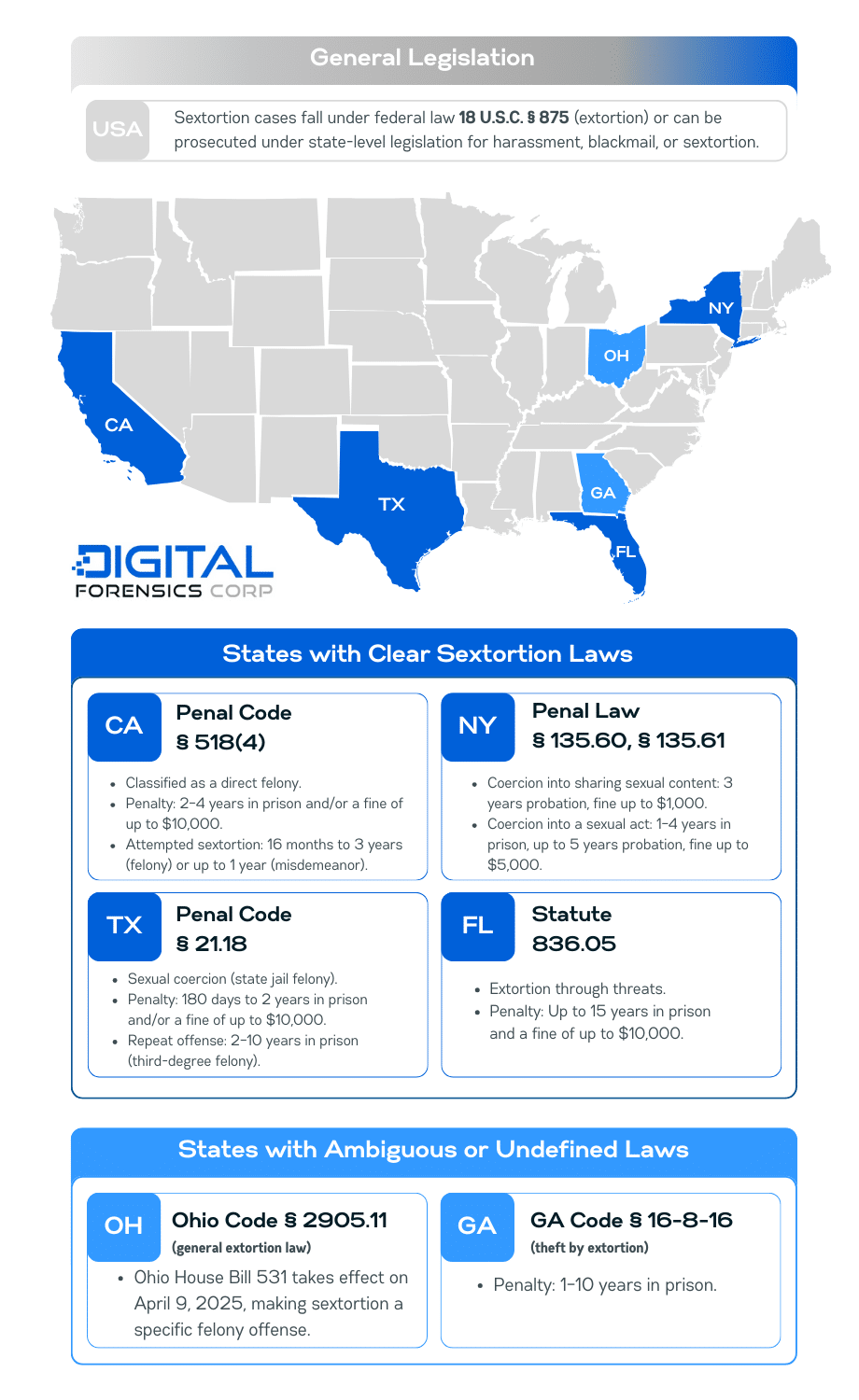It’s every person’s nightmare. You received a terrifying email or text message stating that someone has captured explicit content of you or a loved one. They threaten to release it to friends, family, or colleagues unless you comply with their demands. Fortunately, our experts have compiled information on the crime of sextortion and relevant laws in the United States. Keep reading to learn the steps you can take if you or someone you know are facing sextortion.
Understanding the Crime of Sextortion
Sextortion occurs when someone uses sexual images or videos of a person to extort money. This crime has become more prevalent in the digital age. Cybercriminals can anonymously gain access to personal files or leverage fake profiles to trick users into sending explicit content.
It is essential to remember that the age of the individuals involved matters. Minors generally receive greater legal protections under federal and state laws related to child pornography and exploitation. This results in stricter penalties for distributing intimate images involving minors.
Is Sextortion a Federal Crime?
Yes, sextortion is a federal crime in the United States under certain circumstances. Federal laws related to extortion, cybercrime, and child exploitation may apply depending on the age of the victim and the location of the perpetrator.
Below is a list of all current laws concerning sextortion in the United States at a Federal Level:
- 18 U.S.C. § 875. This statute criminalizes using interstate commerce to send extortionate communications. Any communications made across state lines intended for extortion — including phone calls, emails, or online messages — fall under this law.
- 18 U.S.C. § 2261A. This law addresses cyberstalking and can apply to sextortion, particularly if the victim faces threats through electronic means.
- 18 U.S.C § 2251. This law criminalizes the production of child pornography and the sexual exploitation of minors.
- 18 U.S.C. § 1591. This statute can relate to cases where minors get coerced into producing or distributing sexually explicit materials.
- Revising Existing Procedures on Reporting via Technology (REPORT) Act. The REPORT Act increased regulations on reporting minor sextortion for websites and social media platforms.
- Tools to Address Known Exploitation by Immobilizing Technological Deepfakes on Websites and Networks (TAKE IT DOWN) Act. The TAKE IT DOWN Act criminalized distributing — or threatening to distribute — non-consensual intimate imagery (NCII). It also requires online platforms to remove such content within 48 hours of being notified.
How Do Different States Handle Sextortion Laws?
Laws against sextortion vary depending on the state. However, each state provides legal protections and laws against this crime in one form or another.
Below is a list of resources for each state along with a summary of how they pursue legal action. Each link provides the laws regarding the situations and the legal options available.
Sextortion Laws You Should Know for Residents of All 50 U.S. States:
Choose a state from the list to access the full description of its laws and regulations regarding sextortion.
A-L
- Alabama: Alabama generally addresses sextortion under laws against harassment and extortion.
- Alaska: Alaska covers sextortion in their laws against online harassment and extortion.
- Arizona: Arizona has statutes for extortion and laws addressing the non-consensual sharing of intimate images.
- Arkansas: Arkansas addresses cases of sextortion under their existing laws involving acts of extortion.
- California: California has laws specifically pertaining to the distribution of intimate images without consent.
- Colorado: Colorado covers sextortion under their laws against cyber exploitation and extortion.
- Connecticut: Connecticut state law includes provisions for computer-related crimes and extortion.
- Delaware: Delaware has specific laws that criminalize the non-consensual dissemination of intimate images.
- Florida: Florida has statutes that specifically address the non-consensual distribution of intimate images.
- Georgia: Georgia covers sextortion under their laws regarding privacy invasion and extortion.
- Hawaii: Hawaii addresses sextortion under existing statutes pertaining to harassment and extortion.
- Idaho: Idaho handles sextortion through their laws concerning online harassment.
- Illinois: Illinois has laws prohibiting the distribution of intimate images without consent.
- Indiana: Indiana has various statutes addressing online harassment and extortion.
- Iowa: Iowa covers sextortion under their provisions for harassment and extortion.
- Kansas: Kansas has specific laws criminalizing sextortion.
- Kentucky: Kentucky classifies sextortion as a form of extortion and harassment with specific laws against both.
- Louisiana: Louisiana handles cases of sextortion through their laws on computer crimes and extortion.
M-N
- Maine: Maine has statutes that protect against sextortion as a form of harassment and extortion.
- Maryland: Maryland criminalizes the distribution of intimate images without consent.
- Massachusetts: Massachusetts has created specific laws with regard to sextortion.
- Michigan: Michigan has laws addressing non-consensual image sharing under privacy laws.
- Minnesota: Minnesota has laws covering the non-consensual dissemination of intimate images.
- Mississippi: Mississippi generally addresses these issues under their laws on extortion.
- Missouri: Missouri covers sextortion under their laws against harassment and extortion.
- Montana: Montana handles cases of sextortion under their laws concerning coercion and invasion of privacy.
- Nebraska: Nebraska covers sextortion in their laws concerning extortion and online harassment.
- Nevada: Nevada directly addresses sextortion under their laws against the non-consensual dissemination of intimate images.
- New Hampshire: New Hampshire handles cases of sextortion through their laws on harassment and extortion.
- New Jersey: New Jersey has specific laws against sextortion.
- New Mexico: New Mexico deals with sextortion under their existing harassment regulations.
- New York: New York covers sextortion under extortion and has laws that specifically address the non-consensual dissemination of intimate images.
- North Carolina: North Carolina criminalizes the non-consensual dissemination of intimate images.
- North Dakota: North Dakota has a specific statute that addresses sexual extortion.
O-W
- Ohio: Ohio classifies sextortion under their laws against extortion and harassment.
- Oklahoma: Oklahoma has laws related to extortion and harassment.
- Oregon: Oregon has specific laws relating to acts of sexual coercion.
- Pennsylvania: Pennsylvania has statutes against extortion and any related crimes.
- Rhode Island: Rhode Island criminalizes non-consensual image sharing.
- South Carolina: South Carolina classifies sextortion as an act of harassment.
- South Dakota: South Dakota has laws against acts of harassment and extortion.
- Tennessee: Tennessee addresses sextortion under its extortion statute and has laws against the non-consensual distribution of intimate images.
- Texas: Texas has ordinances pertaining to non-consensual disclosure of intimate images.
- Utah: Utah addresses sextortion through their laws on harassment and extortion.
- Vermont: Vermont has laws against the non-consensual dissemination of intimate images.
- Virginia: Virginia criminalizes sextortion through their laws pertaining to extortion and privacy violations.
- Washington: Washington prosecutes sextortion under their laws against the non-consensual dissemination of intimate images.
- West Virginia: West Virginia addresses sextortion under their ordinances pertaining to extortion and privacy.
- Wisconsin: Wisconsin has laws against harassment and extortion.
- Wyoming: Wyoming addresses sextortion under their harassment and extortion provisions.
States with Clear Sextortion Laws
California
Under California’s Penal Code § 518, sextortion is a form of online blackmail. It pertains to cases in which the perpetrator’s demands involve sexual conduct or images of intimate body parts.
- Committed sextortion is a “straight” felony offense. It carries a punishment of two to four years in prison and/or a fine of up to $10,000.
- Attempted sextortion is a “wobbler” offense, meaning it can be considered either a felony or misdemeanor. Felony charges carry 16 months to three years in prison and/or a fine of up to $10,000. A misdemeanor charge carries up to one year in prison.
Texas
Under Texas’ sexual coercion law, Penal Code § 21.18, sexual coercion is a state jail felony offense. It covers threats of illegal action if the victim does not provide intimate material, sexual favors, or monetary benefit.
- The penalty for such a crime is a prison sentence ranging from 180 days to two years and/or a fine of up to $10,000. The crime increases to a third-degree felony for repeat offenders. This increases the sentence to between two and 10 years.
- Texas law also prohibits the recording, digital production, disclosure, and electronic transmission of sexual material without the consent of the individual depicted under Penal Code Chapter 21.
New York
New York Penal Law § 135.60 criminalizes the act of inducing a person to do something against their will. It is considered coercion in the third degree and is classified as a class A misdemeanor. This includes sharing sexually explicit content with threats against their wellbeing.
- Under Section 135.61, it’s considered coercion in the second degree if the person is coerced into vaginal, oral, or anal sexual contact. This is a class E felony.
- The penalty for a class A misdemeanor in New York can include up to one year in prison, up to three years of probation, and/or a fine of up to $1,000. Class E felony convictions can carry a sentence of one to four years, up to five years of probation, and a fine of up to $5,000 or double the gain from the crime.
Florida
Florida Statute 836.05 criminalizes the use of threats to cause physical or reputational harm to an individual as a means to extort money or coerce the victim to take actions against their will.
- It’s a felony in the second degree and holds penalties including a prison sentence of up to 15 years and a fine of up to $10,000.

States with Ambiguous or Undefined Sextortion Laws
Georgia
While Georgia Code § 16-11-92 is titled Sexual Extortion, it actually protects against sexploitation. You can learn more about the difference between the two crimes by reading our article on Sextortion vs Sexploitation.
Sextortion is truly addressed under GA Code § 16-8-16, which covers theft by extortion. The crime carries a punishment of one to ten years in prison.
States Taking Steps in the Right Direction
Ohio
In the past, Ohio state law only prohibited extortion under Ohio Code § 2905.11. This addresses threats to expose harmful information to obtain any valuable benefit from an individual.
However, this all changed earlier in 2025. Gov. Mike DeWine enacted House Bill 531 on January 9, which criminalizes Sextortion as a felony. The amendment went into effect on April 9, and you can learn more here.
Michigan
Michigan has also made strides in the battle against sextortion. Public Act 261 of 2024 amended the state’s penal code to criminalize threats to release intimate content for coercion. Punishments can reach 25 years based on criminal history, the age of the perpetrator, and the age of the victim.
Kentucky
Kentucky established a unique criminal statute for sextortion when they passed Senate Bill 71. Under the law, sextortion can be charged as a misdemeanor or felony based on severity and other factors. Those convicted of felony sextortion will be added to the state’s sex offender registry.
Are You or Someone You Love a Victim of Sextortion?
If you or someone you love has fallen victim to sextortion, don’t panic. There are resources available to protect you and your loved ones, but it’s important to take the right steps. Here’s what our experts suggest:
- Document everything, including harassing social media accounts, messages, and handles. Do not block them.
- Report the crime to law enforcement. Notify your local police and the FBI. If the victim is a minor, you should report to the National Center for Missing & Exploited Children (NCMEC).
- Do not pay your scammer. Paying will only encourage further financial sextortion. Instead, stall the sextortionist as long as possible while you get help.
- Lastly, seek help from accredited digital forensics engineers, social engineering experts, and lawyers trained in cyber law.
And if you need help handling sextortion, you can reach one of our experts via our 24/7 Sextortion Helpline. Get the help you need to regain control today.






